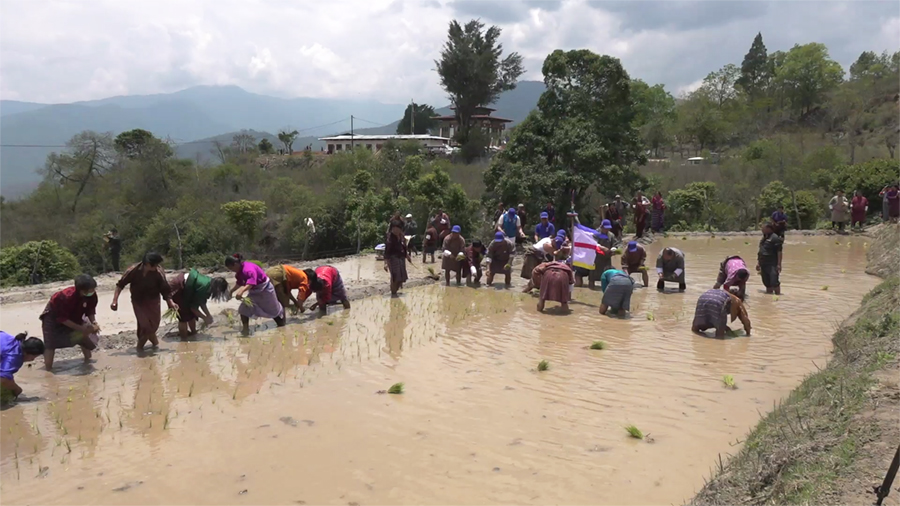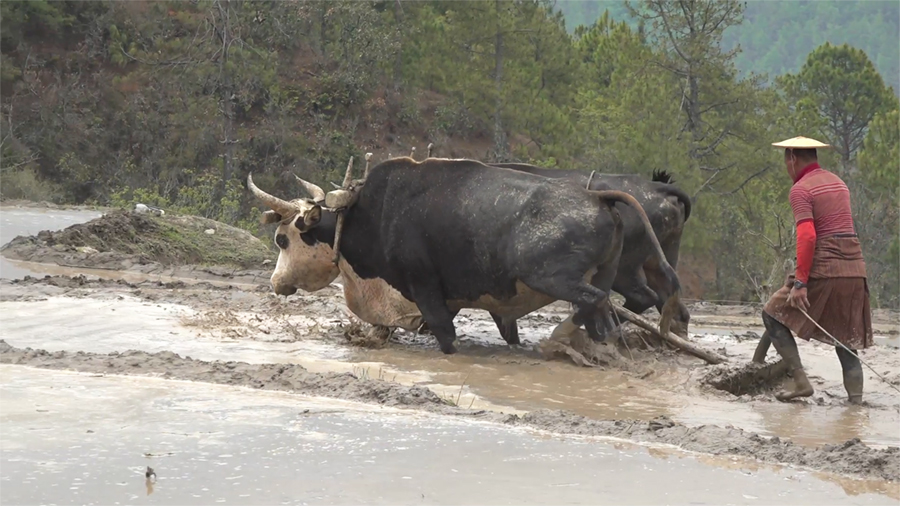
Paddy growers of Phangyuel Gewog in Wangdue Phodrang are resuming rice cultivation after more than a decade. A new irrigation water supply project from the Baychhu stream has resolved their water shortage. The farmers there have been forced to leave their paddy fields fallow for years due to an acute shortage of irrigation water threatening food security and self-sufficiency.

Some farmers of Phangyuel Gewog have not cultivated paddy in their fields for nearly fifteen years. More than a thousand acres of paddy fields remained fallow for years forcing some farmers to even leave their hometown due to a severe shortage of irrigation water.
Usually, by this time, some of them would leave to work for others in the neighbouring villages to earn daily wages to make ends meet.
But this is not the case this season. Today, with irrigation water flowing abundantly into their fields, some of the paddy growers have already transplanted paddy saplings while some are irrigating their fields to begin transplantation works.
They have cleared and prepared their fallow fields for paddy cultivation works as the works for the Baychhu Irrigation Water Supply Project was coming to an end.
Chimi, a farmer in the Gewog said, “After the Baychhu Irrigation Water Supply Project completed, I wake up by 6 AM and start working in my field until dusk with enthusiasm. Earlier, when there was no water supply, we used to just stay and watch others work in their fields. This time, with enough irrigation water from the Baychhu stream, I am working in my field and working to become self-sufficient.”
Yeshi, another farmer said, “So far, due to lack of irrigation water, elderly people had to stay back home looking after the animals and the younger ones used to go to work for others to earn money to raise our family. I have around an acre of paddy fields, which I have already prepared for transplantation. I am waiting for paddy saplings. I am hoping to become a self-sufficient farmer from next year without having to buy rice.”
Apart from paddy cultivation, the gewog residents can also grow vegetables throughout the year for income generation.
“I am quite old to work but the arrival of the Baychhu irrigation water got me excited to work in the paddy fields. I want to cultivate paddy and taste the first harvest of rice from my fields. At this age, I cannot stand and work but can sit and uproot the saplings for transplantation,” said Gyem.
Tashi Dophu, who has left his field fallow for several years said, “I would like to extend my heartfelt gratitude to the government for giving us this water supply. We promise to make the best use of it.”
The 38-kilometer pressured piped water supply was inaugurated and handed over to the Wangdue Phodrang District Administration yesterday. The irrigation water is supplied from the Baychhu stream below Damjithang village in Kazhi Gewog.
The project worth more than Nu. 550 M ngultrum was completed with support from the UNDP and funded by the Green Climate Fund and the government.
It was constructed under the UNDP’s GCF-funded project titled “Supporting Climate Resilience and Transformational Change in the Agriculture Sector in Bhutan.”
The Phangyuel Baychhu irrigation water scheme is one of the 36 such irrigation schemes supported through the same project.
The project also supplied irrigation water for the people of Kazhi Gewog from the same source.
The irrigation scheme is expected to benefit 285 households in irrigating more than 1,200 acres of farmland.
The minister for agriculture and livestock urged the farmers not to leave their fields fallow with the water shortage now resolved.
“Through this project, I would expect the rice of Shar Phangyuel and Kazi to reach the markets in Thimphu by this year or next year. We look forward to buy and taste the rice of Phangyuel and Kazhi in Thimphu,” the minister said.
Following the completion of the irrigation project, some people have even started returning to the village.
Mohammad Younus, the resident representative of the United Nations Development Programme said, “Together with Aum Kuenzang who is back to community after fifteen years living this, the Tibetan bird would also return back and live happily and relay a message that Phangyeul is changed forever.”
As part of inauguration, the community members carried out paddy transplantation at Phangyuel Goenpa where the officials attending the inaugural ceremony also joined.
The district administration is coordinating with the UNDP to carry out necessary survey to encourage farmers to utilise all the fallow land.
Changa Dorji, Wangdue Phodrang
Edited by Phub Gyem







